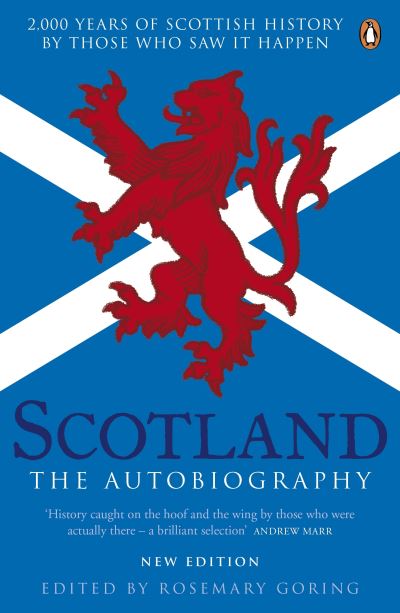Rosemary Goring Press Reviews
'An unqualified triumph, superb, a real page-turner ...what a stirring, dramatic, poignant story it has been.' Alexander McCall Smith, Spectator
'Fascinating and very valuable. Goring gives us vivid snapshots of Scottish life and history from Neolithic times ...should find a place in every Scottish home.' Allan Massie, Scotsman
'History caught on the hoof and the wing by those who were actually there - a brilliant selection.' Andrew Marr
About Rosemary Goring
Rosemary Goring was born in Dunbar and studied social and economic history at the University of St Andrews; and, after graduation, worked at W&R Chambers as a reference editor. Rosemary was the literary editor of Scotland on Sunday, followed by a brief spell as editor of Life & Work, the Church of Scotland's magazine, before returning to newspapers as literary editor of the Herald, and later also of the Sunday Herald. In 2007 she published Scotland: The Autobiography: 2000 Years of Scottish History By Those Who Saw it Happen, which has since been published in America and Russia.
Author photo © Rosemary Goring
Below is a Q&A with this author
1. What inspired you to write After Flodden?
When I first read about Patrick Paniter, one of King James IV’s closest advisors, I began to speculate about the role this man, who most of us have never heard about, had played in the events leading up to the battle of Flodden. Exploring that idea led to the rest of the story.
2. What keeps you motivated as a writer?
The pleasure and challenge of writing itself, and the fascination of immersing myself in the affairs of imaginary or long-dead people.
3. What’s your favourite book and why?
That’s impossible to answer, as my tastes change according to mood and time. However, I do keep returning to Thomas Hardy, Jane Austen, Alice Munro, Charles Dickens, Muriel Spark and John Updike. I also frequently pick up John Galt’s Annals of the Parish, which I have read countless times.
4 .Do you have a routine when you’re writing?
I write and think better in the mornings, though sometimes I start so early I am barely awake. Probably because I’m a journalist I can write almost anywhere, though never to music, which is too much of a distraction.
5. What advice would you give to anyone who wants to be a writer?
Read widely, well, and constantly.
6. What’s the best experience you’ve had while writing a book?
My agent reading the first few chapters and telling me to finish it, fast.
7. If you weren’t a writer, what would you be?
If I had the brains, a vet.
8. If your book was a film, who would you cast for the lead character?
As a journalist my job is to describe events and people accurately. In a novel, however, a writer creates characters who are open to interpretation. By not imposing a fixed set of features on them, and leaving them only partially described writers allow the reader to imagine them for themselves. So while I have a fairly clear image of Patrick Paniter and Louise Brenier in my mind, it’s as if their faces have been pixillated, and to put an actor’s name on them would spoil the way I picture them.
9. Why are books important in your opinion?
They are the best way ever devised for disappearing from real life and forgetting who and where you are. Sometimes they let readers get into the minds and situations of people very different from themselves, but often their most important function is the pure enjoyment one gets from the language of writers whose prose is so pure or fluid, it flows over you like thoughts put to music. People like to make big ethical claims for the importance of books, but more than anything they are about pleasure.
10. Which authors do you particularly admire?
Other than those mentioned earlier, my very long list includes Javier Marias, James Kelman, Leonardo Sciascia, Edward Hoagland, Henry James, James Baldwin, Robert Louis Stevenson, Philip Roth, Rose Tremain, J M Coetzee, Giuseppe Lampedusa and Lucy Ellmann.
More About Rosemary Goring
